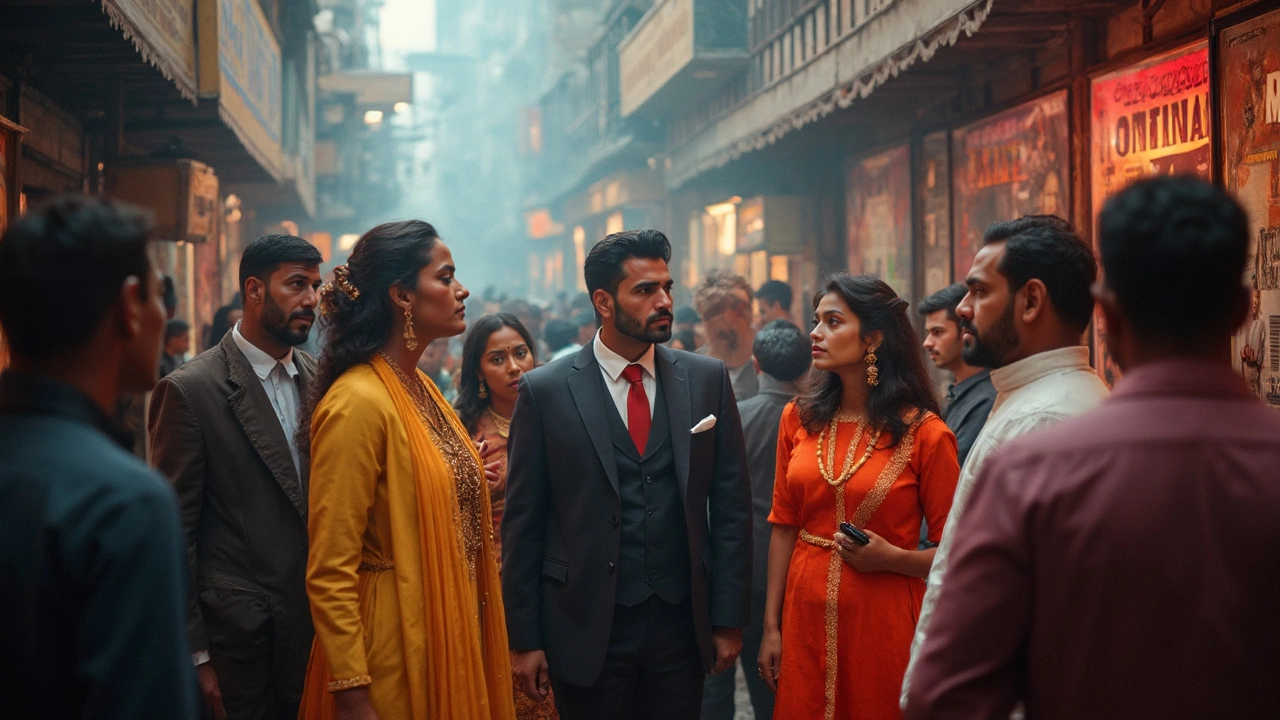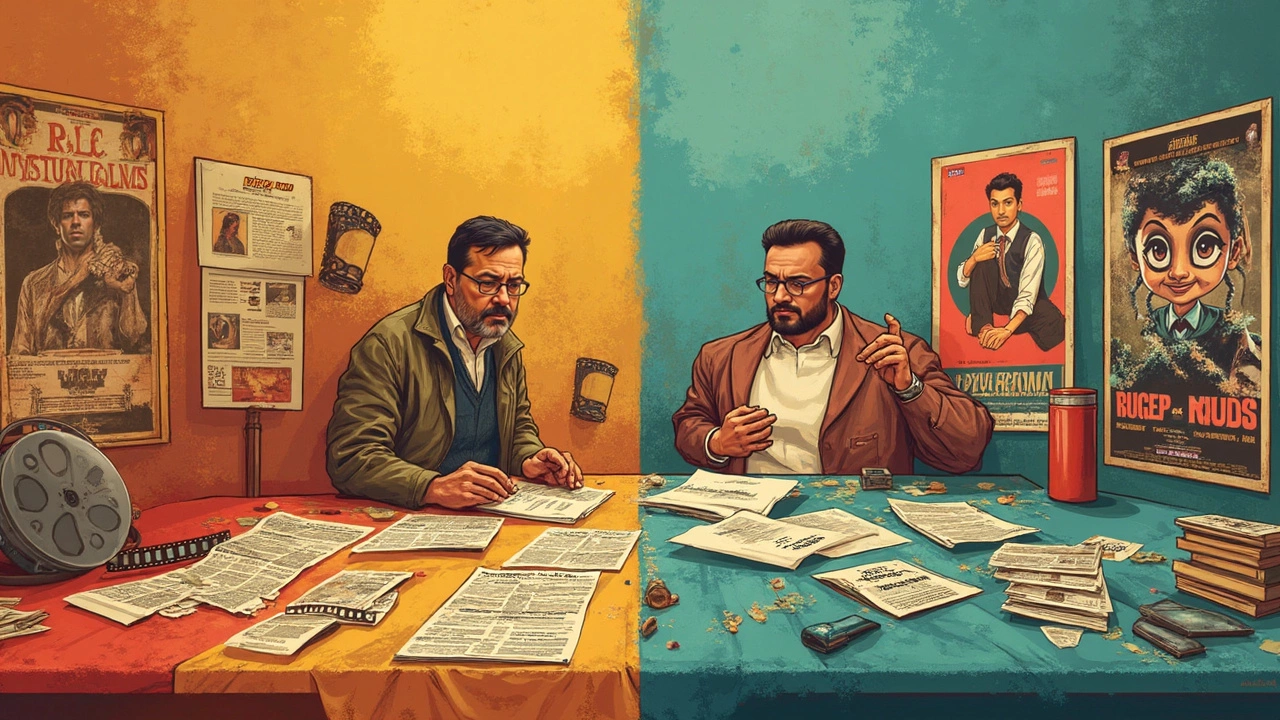Bollywood Remakes: Why They're Taking Over Upcoming Movies in India
 Apr, 26 2025
Apr, 26 2025
What’s the deal with Bollywood and its steady love for remakes? If you’ve been keeping an eye on upcoming Indian movies lately, it feels like every other film is a reboot, a nostalgic rehash, or sometimes even a reworking of a hit from another language. It's almost impossible to scroll through movie announcements without thinking, "Wait, haven't I seen this before?" You’re not wrong.
This isn’t just about a lack of fresh ideas. Studios are doubling down on remakes because it’s less risky than betting on an original story. When a film already has a fan base or proved itself at the box office—either in another regional industry or in another era—the numbers look way safer. You don’t need to guess if people will show up, and there's built-in buzz, thanks to the nostalgia factor or sheer curiosity.
But why does this matter for regular moviegoers? Because more remakes mean choosing between a comfort watch and the thrill of something new. If you’re the sort who enjoys comparing originals and remakes, you’ve got plenty to look forward to. And if you feel like movies are repeating themselves, well, you’re probably right. But there’s a real trick to figuring out whether a remake will feel fresh or just like reheated leftovers—and some studios are getting smarter about how they approach them, mixing up cast, setting, or even the plot for a modern twist.
- What’s Fueling the Bollywood Remake Trend?
- The Money Side: Safe Bets and Proven Stories
- Pitfalls and Fan Reactions: When Remakes Flop
- Spotting a Worthy Remake: What Moviegoers Can Watch For
What’s Fueling the Bollywood Remake Trend?
So, what’s got Bollywood remakes popping up in every new lineup of upcoming movies india? To be real, there’s more than just pure nostalgia at work here. The top reason: remakes make money safer and faster for producers. Studios know if a story already worked in the past—or did wonders in another language—people will probably buy tickets again, even if just to judge the newer version.
Here’s something interesting. A bunch of Hindi film hits over the last five years were straight-up remakes: think ‘Kabir Singh’ (Hindi version of the Telugu film ‘Arjun Reddy’) or ‘Drishyam’ (from Malayalam origins). Both crushed it at the box office. That’s some solid proof why the trend’s not slowing down.
Let’s look at a few big reasons driving the Bollywood remake wave:
- Risk Reduction: Remakes have a proven track record, so they reduce the odds of a complete flop.
- Cross-Industry Success: South Indian and international movies are goldmines for plots that already clicked with crowds there. Hindi remakes ride this wave for their own audiences.
- Expanding the Audience: Lots of people never saw the original regional films. Remakes make sure a good story reaches a national or even global crowd.
- Star Power + Social Buzz: When big Bollywood stars join these projects, the hype multiplies. Sudden casting news often goes viral, roping in a new set of fans.
And here’s a bite-sized stat: According to trade experts, almost 38% of Bollywood releases in 2023 were either remakes or adapted from other languages. That’s a lot of recycled plots—studio heads see those numbers and think, “Why take a big risk?”
With every new teaser drop, you’ll spot familiar stories recharged for a new era. So, love it or hate it, remakes aren’t just a passing thing in Bollywood—they’re deeply tangled into how the industry works right now.
The Money Side: Safe Bets and Proven Stories
Let’s get into why Bollywood remakes are everywhere if you care about box office results. If you’re investing crores into a big movie, you’re looking for anything that reduces your risk. Remakes give producers a comfort zone, and here’s why: They already know the story connects with viewers. That means tried and tested emotional beats, drama, comedy—whatever made the original work. No guessing at audience reactions.
The money talk doesn’t stop there. Distributors and cinema owners love proven stories because they draw crowds who’ve either seen the old hit or have heard about it from parents or media. In 2019, “Kabir Singh”, which was a remake of the Telugu hit “Arjun Reddy”, became one of the highest-grossing Bollywood remakes ever, racking up more than ₹375 crore worldwide. That number isn’t a fluke—remakes like “Bhool Bhulaiyaa 2” (from Malayalam’s “Manichitrathazhu”) and “Drishyam” show this wasn’t just a one-off thing.
| Movie | Original Film | Box Office (INR) |
|---|---|---|
| Kabir Singh | Arjun Reddy (Telugu) | ₹375 crore |
| Drishyam | Drishyam (Malayalam) | ₹110 crore |
| Bhool Bhulaiyaa 2 | Manichitrathazhu (Malayalam) | ₹265 crore |
Another advantage? Marketing gets easier. If a movie industry knows its potential audience remembers the original—or at least the title—they can build hype with less effort. Stars and directors aren’t hard to convince either, since almost everyone wants to be part of a ‘sure thing’.
The flip side, though, is that studios sometimes overestimate the pull of nostalgia and ignore the cost of buying remake rights, which can top ₹5-10 crore for a top South Indian hit. However, this is still less than gambling on an unknown script or a new director. Studios run the numbers and realize even a 60% repeat of the original’s success is often profitable—much safer than betting on something brand-new.
So the next time you see an “Upcoming Bollywood remake” announcement, know it's less about ideas running out and more about business math. It’s like ordering your favorite dish—you already know it’s going to sell.

Pitfalls and Fan Reactions: When Remakes Flop
Remakes are everywhere in Bollywood, but let's be real—sometimes they just don’t land. The main gripe from fans? Remakes often miss the spark that made the original movie special. People care about nostalgia, and changing too much or too little sets off alarms. If the remake is a scene-for-scene copy, it feels pointless. But if it tries to get too clever, hardcore fans call it disrespecting the source. There’s no pleasing everyone, but there are patterns to what really ticks people off.
Look at some recent flops to get the picture. When ‘Coolie No. 1’ was rebooted in 2020, viewers hated the recycled jokes and wooden acting. The backlash flooded Twitter—memes were everywhere. Same story with ‘Himmatwala’ (2013): critics shredded it, and its box office earnings tanked. Turns out, even A-list stars can’t always save a bad Bollywood remake.
Some remakes have another issue: translating stories across cultures doesn’t always work. Remaking a gritty Tamil thriller in Hindi sounds like a win, but if the dialogues or setting lose their punch, audiences don’t buy it. The Hindi version of ‘Ok Jaanu,’ for example, lacked the chemistry and charm of the Tamil original ‘OK Kanmani.’ That disconnect cost it viewers and buzz.
Now, here’s a quick look at how these flops actually perform versus originals:
| Film | Original Box Office | Remake Box Office |
|---|---|---|
| Coolie No. 1 (1995/2020) | Hit | Below Average |
| Himmatwala (1983/2013) | Blockbuster | Flop |
| OK Kanmani/Ok Jaanu | Hit (Tamil) | Average (Hindi) |
Bottom line: Remakes carry a big risk of annoying both longtime fans and new viewers, especially if they don’t bring something genuinely interesting to the table. If you spot a remake, check if the filmmaker is shaking things up or just hitting copy-paste—you’ll usually be able to tell which way it’ll go based on the first trailer or fan chatter online.
Spotting a Worthy Remake: What Moviegoers Can Watch For
Not every Bollywood remake ends up as a crowd-pleaser. Honestly, plenty of them just fizzle out or annoy fans of the original. So, how do you figure out if a remake is actually worth your ticket money—or just another recycled cash grab?
First, look at who's making it. When you see filmmakers like Vishal Bhardwaj or Sriram Raghavan attached, chances are they’ll shake things up, not just copy-paste. Bhardwaj’s “Maqbool” (a take on Macbeth) showed it’s possible to respect an old story and still make it feel new. New directors tend to bring out bolder remakes too, but you have to dig a bit—sometimes the crew is the real star, not the actors.
Second, check what’s being remade. Remaking a classic (“Don,” “Agneepath”) is riskier because old-school fans are waiting to pounce on any misstep. Sometimes, lesser-known South Indian hits get remade and actually surprise the all-India crowd. Think about “Drishyam”—first a Malayalam movie, then a Hindi remake with Ajay Devgn that clicked with a wider audience.
- Original vs Remake: Compare trailers and promos. Are they shot-for-shot or is there a different vibe?
- Cast Choices: Is someone shaking up a lead role, or is it the same old “star for star” approach?
- Setting and Context: Have they pulled the story into modern times, or just swapped out location names?
- Director’s Style: Is the director known for playing it safe, or for risky, interesting choices?
All this matters because, at the end of the day, remakes live or die by how much they respect the original while still offering something new for fans. If you see a Bollywood remake that’s getting buzz for its bold new direction, it’s probably worth checking out even if you loved the first version.
Here's a quick look comparing some recent remakes and how they fared versus their originals:
| Movie (Hindi Remake) | Original (Language) | Result (Box Office) |
|---|---|---|
| Drishyam | Drishyam (Malayalam) | Hit |
| Jersey | Jersey (Telugu) | Flop |
| Laxmii | Kanchana (Tamil) | Average |
| Bhool Bhulaiyaa 2 | Manichitrathazhu (Malayalam) | Hit |
So, next time a remake hits the screens, check these signs. You’ll know if you’re in for something fresh, or just the same old song and dance—literally.